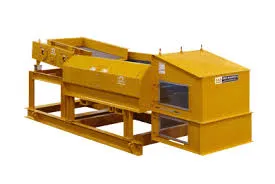

oct. . 21, 2024 12:10 Back to list
The Importance of Construction Waste Crushers in Sustainable Development
In the rapidly evolving world of construction, the emphasis on sustainability and environmental stewardship has become paramount. One innovative solution that has gained significant traction is the construction waste crusher. This powerful machinery is designed to efficiently process waste generated during construction activities, turning it into reusable materials and minimizing the environmental impact of construction operations.
Construction waste is a significant issue globally. It includes rubble, discarded materials, and debris from various construction and demolition projects. According to estimates, construction waste accounts for approximately 30% of the total waste generated in large urban areas. This staggering figure highlights the necessity of effective waste management strategies in the construction industry. Employing construction waste crushers not only addresses the waste problem but also contributes to a circular economy.
A construction waste crusher operates by breaking down large chunks of debris into smaller, manageable pieces. This process provides several advantages. Firstly, it reduces the volume of waste that would otherwise occupy landfills. By minimizing landfill use, we can preserve natural resources and reduce the environmental burden associated with waste disposal. Furthermore, recycling materials mitigates the need for new raw materials, thus conserving energy and reducing greenhouse gas emissions related to material extraction and processing.
Additionally, construction waste crushers help contractors save money. By recycling materials on-site, construction firms can significantly reduce disposal costs and the expenses associated with purchasing new materials. Materials such as concrete, asphalt, bricks, and even metals can be crushed and repurposed for future projects. For instance, crushed concrete can be used as aggregate in new concrete mixes, while recycled asphalt can be reused in paving projects. This practice not only cuts costs but also promotes sustainability within the industry.

Moreover, the use of construction waste crushers aligns with global sustainability goals. Many countries are setting ambitious targets to reduce carbon footprints and promote recycling. For example, the European Union has committed to achieving a recycling rate of at least 70% for construction and demolition waste by 2025. Incorporating construction waste crushers into the waste management process helps fulfill these commitments by enhancing the quality and quantity of recyclable materials.
In terms of design and functionality, construction waste crushers have evolved significantly over the years. Modern crushers are equipped with advanced technology that allows for greater efficiency and effectiveness in processing various types of construction waste. They are often mobile, enabling contractors to bring the recycling process directly to the worksite, thus minimizing transportation costs and time. Furthermore, these machines can be adjusted to produce different sizes of crushed material, catering to specific project needs.
Despite the clear benefits, the adoption of construction waste crushers is not without challenges. One primary concern is the initial investment required for purchasing such machinery. While the long-term savings and environmental benefits are substantial, the upfront costs can deter smaller contractors. However, many leasing options and government incentives are available to alleviate this burden, making it easier for firms to incorporate sustainable practices into their operations.
In conclusion, construction waste crushers play a crucial role in promoting sustainability in the construction industry. By efficiently processing waste, these machines minimize landfill use, reduce costs, and conserve natural resources. As the world pushes towards a greener future, integrating construction waste crushers into standard practices becomes not just beneficial but essential. The construction industry must embrace this technology to foster a more sustainable, responsible, and economically viable future. As we strive for a circular economy, the role of construction waste crushers will undoubtedly continue to expand, paving the way for more environmentally friendly construction practices.
Latest news
Troubleshooting Common Eddy Separator Problems
NewsJul.04,2025
The Role of Metal Recycling Plants in Circular Economy
NewsJul.04,2025
The Impact of Recycling Line Pickers on Waste Management Costs
NewsJul.04,2025
Safety Features Every Metal Shredder Should Have
NewsJul.04,2025
How Industrial Shredders Improve Waste Management Systems
NewsJul.04,2025
How Cable Granulators Contribute to Sustainable Recycling
NewsJul.04,2025